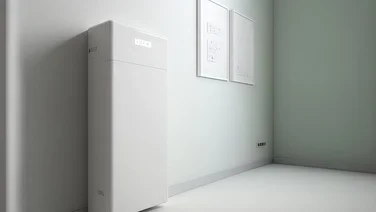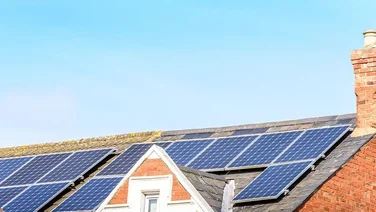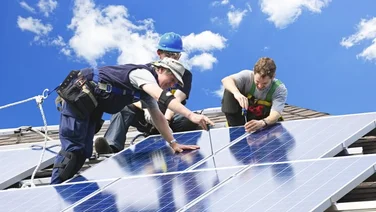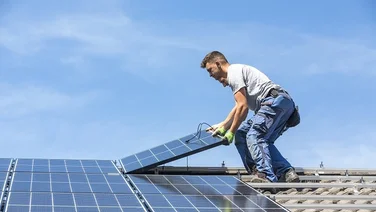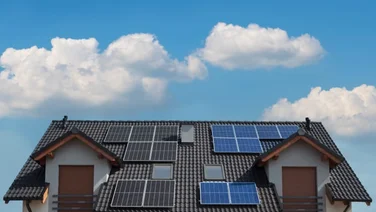We receive a small fee from trusted installers when you request a quote through our site. This helps us keep our content independent, well-researched and up to date – Learn more
- There is 0% VAT on solar panels installations in the UK
- The 0% VAT rate also applies to solar storage batteries
- The VAT cut ends on 1 April 2027, when it will revert back to a 5% reduced rate

Despite development in the industry, the cost of solar panels is still pretty high, so it’s important to be aware of any measures that can make them cheaper, such as solar panel grants and government funding schemes and the Value-Added Tax (VAT) cut, which was introduced in April 2022.
In this article, we’ll take you through how the VAT cut applies to solar panel systems, and explain exactly which products and services qualify for different VAT rates.
If you already have all the information you need about VAT for solar panels, and want to find out how much one will cost you, you can fill out our short form. Just provide a few details about your property, and we’ll put you in touch with qualified solar panel installers, who will supply free quotes.
Where do you want to install solar panels?
Get startedIs there VAT on solar panels?
The installation of solar panels on residential properties in the UK is currently zero-rated for VAT until 31 March 2027. This means that for both the cost of the solar panels and the installation service, no VAT is charged, though there are a few exceptions to be aware of.
For example, you won’t pay VAT on solar panels or the installation if you use the same provider to supply and install them.
However, if you buy your solar panels from one provider, and choose a different provider to install them, you will pay 5% VAT on the cost of installation. You’ll also pay 5% VAT on the cost of any repairs or maintenance services that happen after your initial solar panel installation.
Before April 2022, the standard rate of VAT in the UK was 20%, or 5% under certain criteria, such as if you were over 60, or on certain benefits.
It’s worth noting that in Northern Ireland, the 0% VAT rate on solar panels came into effect in May 2023, a year later than the rest of the UK, but it will end at the same time, in April 2027. Check out our page for more information on getting solar panels in Northern Ireland.
VAT has also been cut for some low-carbon heating technology, such as air source heat pumps.
Has this actually made the cost of solar panels cheaper?
The 0% VAT rate has made solar panels slightly cheaper, but not by much.
For example, under the old 5%–20% VAT rate, a 3.5 kilowatt peak (kWp) solar PV system (suitable for a three-bedroom house) would cost around £7,860 in 2022. Under the current rate of VAT, that same system would cost around £7,026.
However, because of rising inflation, many installers have had to raise their prices. So the average buyer today will still be paying a similar amount for their solar panels to what they would have paid before the 2022 VAT cut.
If you’re looking to relieve some of the costs of going solar, there are also some government grants for solar panels available.
Why did the UK government cut VAT on solar panels?
The UK government cut VAT on a number of energy-saving products, including solar panels, to encourage more homeowners to install them by making them cheaper.
The government is also aiming to improve the energy efficiency of UK homes to help with the cost of living crisis – and solar panels can help achieve this.
Encouraging more homes to invest in renewable energy, such as solar, will also support the UK government’s pledge to reach net zero by 2050. More homes using renewable energy, means fewer carbon emissions.
Want to find out more about how renewable tech can cut your energy bills? Read our page on how an eco-home can save you money.
Where do you want to install solar panels?
Get startedHow long will the 0% VAT rate last?
The 0% VAT rate on solar panels will last until the 1st of April 2027. After that, VAT on solar panels will increase to 5% – meaning it won’t go back to the 20% rate.
You won’t need to meet the pre-April 2022 criteria to qualify for the reduced rate either. The 5% VAT rate will apply to solar panels being installed on any residential property.
This means that even when the 0% rate ends in 2027, you’ll still pay less VAT on solar panels than you would have before April 2022.

Do you have to pay VAT on solar batteries?
As of February 2024, you no longer have to pay VAT on solar batteries.
Prior to this, 0% VAT only applied to solar batteries if they were installed alongside solar panels. That means you still had to pay 20% VAT on solar batteries that were installed as a stand-alone product, or retrofitted onto an existing solar panel system.
Luckily, the government has now added solar batteries to their list of energy-saving products that qualify for 0% VAT, regardless of what they’re installed alongside of.
Like solar panels, solar storage batteries can reduce both energy bills and carbon emissions by storing excess electricity produced from the panels, to be used later.
How does the UK’s solar VAT rate compare with the rest of Europe?
The European Union (EU) also updated its VAT regulations in April 2022, and now allows its member states to cut VAT on solar panels, and reduce VAT to as low as 5% on other energy-saving products, such as heat pumps. Since then, a few EU countries have taken advantage of the new regulations.
For example, in Germany, there has been no VAT on solar panels or solar batteries – including both materials and installation – since January 2023.
Belgium reduced VAT on solar panel systems to 6%, between April 2022 and December 2023, but it has now gone back up to 21%.
In most European countries, you still have to pay some VAT on solar panels – unlike in the UK. But with the EU also aiming to reach net zero emissions by 2050, more EU members could follow suit, and reduce or cut VAT on solar panels in the future.
For example, Austria just recently reduced VAT to 0% on residential solar panel installations in January 2024.
Next steps
According to the latest data from Microgeneration Certification Scheme (MCS), over 1.4 million solar panel systems have been installed across the UK, up from 1.2 million in 2022.
It’s not hard to see why solar panels are staying popular. After all, using solar energy will lead to cheaper electricity bills for you, and fewer carbon emissions for the planet.
And with the 0% VAT rate on solar panels in place for the next few years, there’s never been a better time to invest in solar panels.
If you’re ready to start using solar energy and want to find out how much a set of panels will cost you, then fill out our quote form. We’ll pass your details on to professional solar panel installers, who’ll provide you with their best prices.



